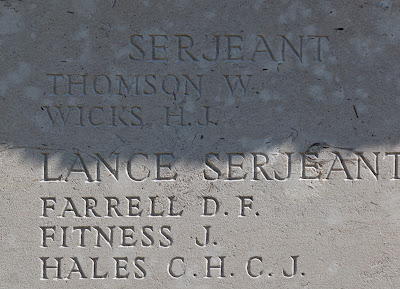Part of my ambivalence may be put down to lack of personal connection. Being Irish, I thought the wars of the British Empire were nothing to do with us. I was rather astonished then to learn this week that one of my ancestors was an Anzac - my great uncle, Daniel Farrell.
How did a boy from Dublin end up fighting for New Zealand? It's a fairly simple story. He travelled from Ireland to New Zealand, part of the great diaspora of Irish people that has been a constant throughout our history. Then he wanted to go home. There was a war being fought in Europe; signing up seemed like a good way to get there. And so he ended up as a Lance Corporal in the New Zealand Rifle Brigade, departing Wellington on 5 February 1916.
He made it so close to Ireland, but not close enough. He was killed in action in the Somme, France on the first day of The Battle of Flers-Courcette. He was 27. He was buried where he fell, and has no known grave. He is remembered at the Caterpillar Valley (New Zealand) Memorial on the battlefield in France.
There's also a tribute to Daniel and those who fought alongside him in the form of a stained glass window at the Auckland War Memorial.
In Memory of
Lance Serjeant DANIEL FRANCIS FARRELL
25/750, 3rd Bn. 3rd, New Zealand Rifle Brigade
who died age 27
on 15 September 1916
Son of Daniel and Emily Farrell, of 227, Merrion Rd., Dublin, Ireland. Eldest of three brothers who fought in the War, two of whom fell, and the third wounded three times.
Remembered with honour
We are glad to have these memorials. There are no photos. As the memorial says, Daniel was the eldest of three brothers. Another brother died, and a third brother was wounded. Great Uncle Clem was, as they said "never quite the same" after his war time experiences. He never married and had no children. The brothers also had a sister - my great grandmother, Eileen, for whom my mother is named.
We say "lest we forget". I'm not sure if the current lionization of the Anzacs isn't someway worse than forgetting - imbuing the pointless slaughter of these young men with a grandeur that leads future generations to emulate their tragic destiny. But nevertheless, I won't forget Daniel and his brothers, and I'll be telling BabyG their stories too. And when he's a little older, I'll take him to the Anzac Day march, not because it all means something, but in memorial to these young men who went before him, who died far too young.



Thanks for sharing this simple and touching story.
ReplyDeleteAs I watch the Anzac Day marches each year, I am always moved, because there are so many, many stories like yours of folk who weren't born to be heroes; nor were they born to die young and leave their loved ones in grief - but they did, and they will continue to do so - and it hurts us all, so much.
Wow, that's a very moving story. And I saw The Battle of the Somme only last week, cleaned up for the big screen at the Silent Film Festival..futile! I agree with your sentiments about the day, I cringe at things I see on the news, in our streets, on the web. I am sure a lot of people 'get' it, but so many just don't seem to. I don't think using it as an excuse to party and drink is at all respectful. I take a quieter, more peaceful stance in thinking about what came before us and wishing that it wasn't still happening somewhere in another part of the world...but it is :(
ReplyDeleteThe third brother was John Leo Farrell who was killed in 1918 and was in the Royal Irish Regiment. John is in the 1911 census working for a Chemist in Limerick. Daniel Francis was a seaman prior to joining the Anzacs. Clem was a career soldier as he was in the army prior to the war. He married a widow named Fox.
ReplyDeleteI am your mother's first cousin and godchild to your grandparents Jack & Pauline.
Maurice
It was Clare John Leo was living in at the time of the 1911 census.
ReplyDelete